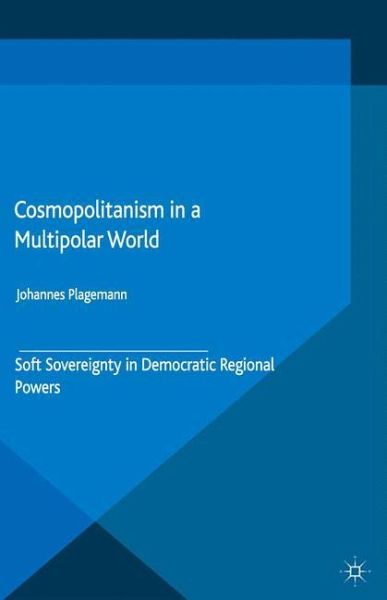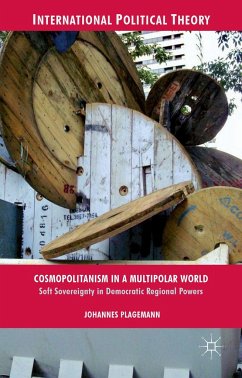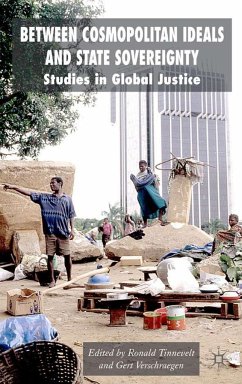
J. Plagemann
Broschiertes Buch
Cosmopolitanism in a Multipolar World
Soft Sovereignty in Democratic Regional Powers
Versandkostenfrei!
Versandfertig in 6-10 Tagen

PAYBACK Punkte
19 °P sammeln!





Based on an analysis of the changing practice of sovereignty in Brazil, India and South Africa, this book argues that soft sovereignty provides an adequate, yet unrecognized, basis for a moderate, embedded and plural cosmopolitanism situated between globalism's demand for a world state and statism's defence of the status quo.
Dr. Johannes Plagemann is research fellow at the GIGA Institute of Asian Studies in Hamburg, Germany. He was a post-doctoral member of the Sofja-Kovaleskaja research group on 'Background Justice between States: Global Institutional Design to Foster Sovereign Statehood' at the Technical University Darmstadt (2014) and research fellow at the GIGA Institute of African Affairs (2010-2014). He teaches at the University of Hamburg and publishes in scholarly journals such as Globalizations and Global Justice: Theory Practice Rhetoric. Johannes Plagemann studied Philosophy and Economics in Bayreuth and Sao Paulo (BA) and Political Sciences in Hamburg and Bordeaux (MA). He did fieldwork in Mozambique, Brazil, South Africa, and India.
Produktdetails
- International Political Theory
- Verlag: Palgrave Macmillan / Palgrave Macmillan UK / Springer Palgrave Macmillan
- Artikelnr. des Verlages: 978-1-349-50400-8
- 1st ed. 2015
- Seitenzahl: 312
- Erscheinungstermin: 1. Januar 2015
- Englisch
- Abmessung: 216mm x 140mm x 17mm
- Gewicht: 395g
- ISBN-13: 9781349504008
- ISBN-10: 1349504009
- Artikelnr.: 45069783
Herstellerkennzeichnung
Macmillan Education
Tiergartenstr. 17
69121 Heidelberg
ProductSafety@springernature.com
'Cosmopolitanism in a Multipolar World is a shining example of the type of bridge-building work that the literature desperately needs. Plagemann succeeds in bridging the gaps between the champions of national sovereignty and those who herald a full-blown cosmopolitan order, and between the empirically-inclined study of regional powers and the normatively-focused analysis of what a just global order should look like. Central to his project is the notion of soft sovereignty, the bounded exercise of rightful authority, and he shows how this notion can be fruitfully used to reveal aspects of the foreign and domestic behaviour of emerging powers such as Brazil, India, and South Africa that otherwise would be left unexplored. Most stimulating,
Mehr anzeigen
though, is how he uses this notion to modify and moderate cosmopolitanism itself. He argues that the empirical analysis of soft sovereignty in practice reminds us of power asymmetries in the world and of the fundamentally moral role that the honouring of national (and sub-national) communities and national development goals can play in mitigating these asymmetries. This is a very fine and detailed piece of work and it deserves to be widely read and discussed.' Philip Nel, Professor of Politics, University of Otago, New Zealand
'Cosmopolitanism in a Multipolar World is an extremely sophisticated assessment of regional powers from a cosmopolitan point of view. It carves out the cosmopolitan potential in Brazil, India and South Africa. Soft sovereignty is an apt term to capture the ambiguities and intricacies of the political thinking in these rising democracies.' Dr. Michael Zürn, Director, Global Governance, Wissenschaftszentrum Berlin, Germany
'This is a remarkably original book, which stands out in its ambitious attempt to bridge the long-standing and unhelpful divide between Political Theory and Comparative Area Studies. Offering great value-added to the reader in its sophisticated theorising and rich empirical detail, it develops an insightful analysis of the evolving concept of sovereignty in a world undergoing major power transitions.' Professor Amrita Narlikar, President, German Institute of Global and Area Studies
'Cosmopolitanism in a Multipolar World is an extremely sophisticated assessment of regional powers from a cosmopolitan point of view. It carves out the cosmopolitan potential in Brazil, India and South Africa. Soft sovereignty is an apt term to capture the ambiguities and intricacies of the political thinking in these rising democracies.' Dr. Michael Zürn, Director, Global Governance, Wissenschaftszentrum Berlin, Germany
'This is a remarkably original book, which stands out in its ambitious attempt to bridge the long-standing and unhelpful divide between Political Theory and Comparative Area Studies. Offering great value-added to the reader in its sophisticated theorising and rich empirical detail, it develops an insightful analysis of the evolving concept of sovereignty in a world undergoing major power transitions.' Professor Amrita Narlikar, President, German Institute of Global and Area Studies
Schließen
Für dieses Produkt wurde noch keine Bewertung abgegeben. Wir würden uns sehr freuen, wenn du die erste Bewertung schreibst!
Eine Bewertung schreiben
Eine Bewertung schreiben
Andere Kunden interessierten sich für













